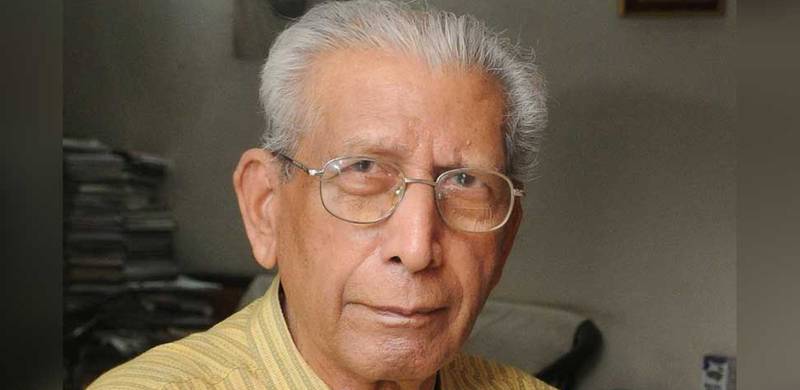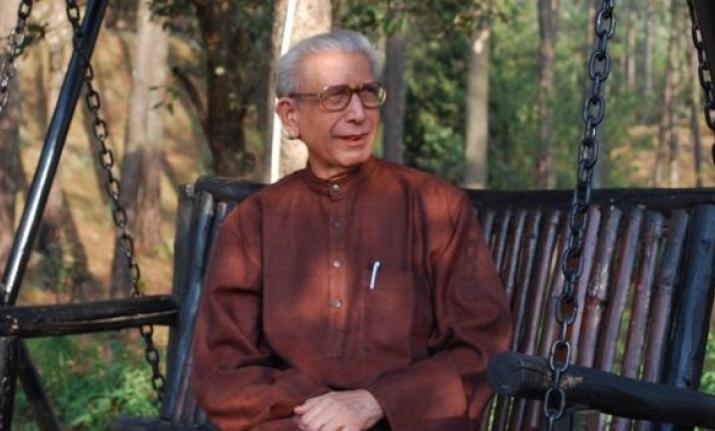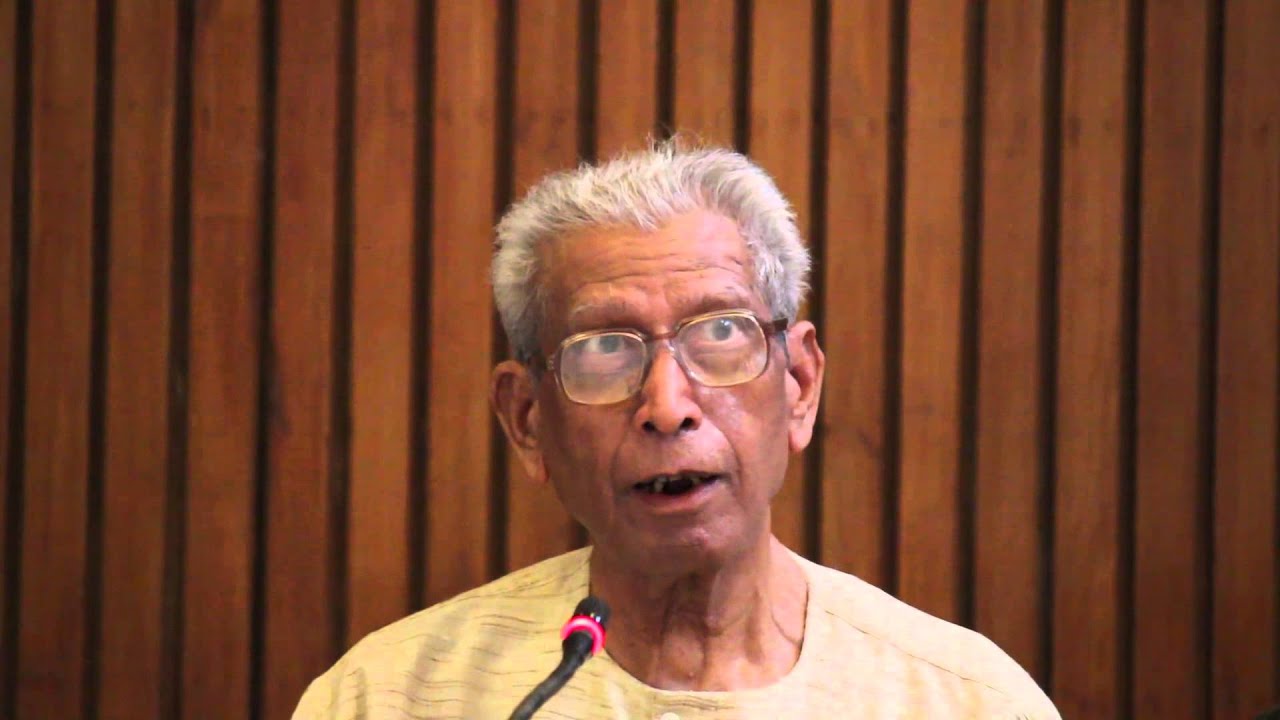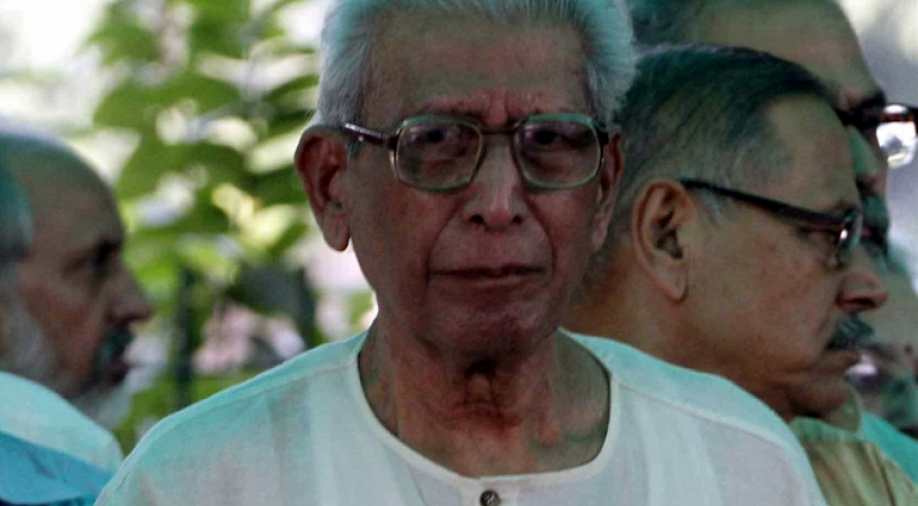
Dr Namwar Singh, a poet, fiction writer and literary critic of Hindi, died on February 19, 2019 at the age of 93. Zaman Khan had interviewed him on his Lahore visit on the occasion of SAARC Writers Conference in 2003. Re-posting it for Naya Daur's readers.
Dr Namwar Singh, a poet, fiction writer and literary critic of Hindi, was born on July 28, 1926, in village Jeeanpur, district Benares. His father, a school teacher, somehow got his date of birth registered as May 1 at the time Namwar was admitted to school. Namwar says this mistake had a special impact in his life and he became a communist.
He did Masters and PhD in Hindi from the famous Hindu University of Benares. Initially interested in linguistics studies, he joined the teaching profession. He was dismissed from service after he decided to contest a by-election in 1959 on the ticket of Communist Party of India against a Congress candidate. Not only did he lose the election, he also lost his job and remained unemployed for five years. He was then assigned to look after the party magazine (Hindi version of 'Newage') in Delhi. He worked there for some years when he was offered a teaching job – to establish a Hindi department in Jodhpur University. In 1972 when Jawahar Lal Nehru University (JNU), Delhi wanted to set up a Hindi department, he was requested to head it. It was from here that he retired in 1992.
Since his student days, Dr Singh had an interest in literature. His first collection of poetry Neem Kay Phool and a collection of personal essays Ba Qalam Khud were published when he was still a student. In the wake of challenge from extreme Hindu forces, he has been successful in uniting writers from three main communist parties on one platform. He also attended golden jubilee function of Progressive Writers Association (PWA) in London in 1986. A function was also organised in Lucknow to mark the occasion and some leading writers from Pakistan also attended which included late Sibt-e-Hasan.
https://www.youtube.com/watch?v=-21pIt3RqnE
His love of folk-poetry led him to study folk literature of all the languages of India. He can fluently quote from all the classical poets of Punjabi language. In fact his study of Kabir and his message of love and harmony opened the way to the study of Bulleh Shah, Shah Hussain, Baba Farid and Waris Shah. He finds similarities in Kabir and folk Punjabi poets; the message of love, harmony and resistance in all Sufi poets. He thinks Sufi tradition is in fact a tradition of resistance.
He introduced Punjabi Sufi poetry to the Hindi readers/writers. He edited and published the poetry of all the classical folk, Sufi poets in Hindi scripts under Bhai Veer Singh Foundation. He thinks Hindu communalism could be combated with the message of mystics.
He is not just an arm-chair intellectual. He resigned from CPI when it supported the emergency of Indira Gandhi and never looked back.
He has travelled a lot but it was his dream to see Lahore, the city of Faiz, his personal friend and comrade – he can quote Faiz verbatim. And hence the child-like happiness on the fulfilment of his lifelong, old, cherished dream of visiting the city. He came to Lahore to attend 10th SAARC Writers Conference.
Excerpts of an interview with him follow:
Q: Tell us about your literary interests?
A: I did my research in early Hindi poetry, which is proto modern Hindi, spoken in the western part and mostly written in some part of Pakistan and then western India, Gujarat, Rajasthan, Punjab (old Punjab).
Q: Your views on the Progressive Writers Association?
A: I have been associated with Progressive Writers Association from my student days. I attended the conference in which Krishan Chandar was made Secretary General who was in fact not the right person for that office. He was a great fiction writer but not an organiser. As a result there was really no All India Progressive Writers Association. There was just a small chapter of the association in Allahbad. After Bannay Bhai (Sajjad Zaheer) came back to India from Pakistan he tried to reorganise it. I and comrade Taqi were made Deputy Secretaries. After Sajjad Zaheer's death, we formed a Federation of Progressive Writers Association. I am at present President of All India Federation of Progressive Writers Association.

Q: The coming into power of Hindu extremists like BJP and RSS is a failure of the secular and progressive forces. Do you agree?
A: I started a quarterly journal called 'Aalochna' (Criticism) in 1967 and in the first issue we predicted and discussed that fascism was imminent in India because anti-Congress sentiment was at its peak in UP and Bihar and in some other states. Ram Monohar Lohyia made a United Front against Congress and Communist Party was also part of it. In those days there was no BJP, only Jung Sung. It was a dangerous phenomenon. The first communal riots took place in Jamshedpur. We used to think that in an industrial area, where trade union has a very strong base, there is no danger of communal riots. But the first communal riots in India took place in an industrial city. That was a big blow to secular and progressive forces. In those days Communist Party and Jung Sung (this Hindu party) were collaborating with each other. I discussed the whole thing in an editorial. When I restarted this magazine in the millennium year 2000, again the whole issue was devoted to the danger of fascism to India. Last year the Annual Conference of Progressive Writers was organised at Hyderabad where I gave the slogan of Popular Front. All left organisations along with other secular and democratic organisations must form a front. As the slogan of Popular Front was given in the thirties against Hitler and Mussolini. In the same way we must form the popular front in which even theatre people, film makers, writers, musicians have to join hands. We are going to organise a Convention on 6th of April 2004, the day PWA was organised in 1936. We are going to celebrate it. We will hold meetings, organise some rallies, some conventions.
Q: Tell us about your writings.
A: I started writing at a very early age and my book of poetry and prose was published when I was a student. My book Kaveetan Kay Nai Batiman 'Towards new standards of poetry' won Academy of Letters Award in 1971. Some of the chapters have been translated into some Indian languages. After that in 1983 another book Doosari purumpara key Khoaj (The Concept of Culture) was published in which I established that every culture has two traditions. That second or other tradition belongs to tradition of protest, resistance of common people. So I tried to theorise it with concrete examples from our own Indian tradition. That book was very well received. Now I have published four-five essays on Kabir. During the days of 'Hindutva', I thought that Kabir is the poet who symbolises the spirit of resistance against communalism. So by this book we shall be able to fight communalism. Kabir is very much needed. I hope this book will be published before the end of this year.

Q: How do you link Kabir with Punjabi Sufi traditions?
A: I discovered that link while working on Kabir – particularly the Sufi tradition in Punjab of Bulleh Shah and Waris Shah. This tradition was not much known in the Hindi world and was limited to the Punjabi world. So I edited four books, with an introduction in Hindi script, published by Bhai Veer Singh Foundation. This tradition actually has close relationship with Hindi Sufi tradition, from Maulana Dawood and Maulvi Mohammad Jaiesee and Noor Mohammed and we have a long and unbroken tradition. Even up to twentieth century, Sufi writing is going on. There was an understanding that the Sufi writings were only available in Gurbani texts but now we have realised the stronger Sufi tradition of Baba Farid, Bulleh Shah and Waris Shah and this tradition is actually a pan-South Asian phenomenon and can be found in Sindhi, Seraiki and other languages also. So I think that this broader concept of South Asia gives us a new dimension and new meaning and I hope I shall be able to include it in my book.
Q: There are very few translations of Hindi available in Pakistan?
A: Most of the significant Urdu writings are available in Hindi. Actually in India, Hindi is playing the same role as English is playing at international level. So, most of the writings from Punjabi, Sindhi, Marathi, Tamil, Bangla have been translated into Hindi. Even from Bangladesh, Tasleema Nasreen has been translated, all her books have been translated in India. So Urdu and Punjabi writings are available in Hindi.

Q: What role can the writers play to bring peace in the region?
A: There should be more exchanges. Out of ten SAARC writers’ conferences, nine took place in other countries. This was the first held in Lahore. There should be an easy visa regime and free flow of information, books and newspapers. We get books through friends, otherwise there is no open channel.
Q: Amrita Preetum complained that all her books have been published in Pakistan without her permission and she has received no royalty. Your comments?
A: We must think about copyrights which is a real problem. In India we are free to publish and translate books from Pakistan but these writers don't get royalty. Same is the case here.
Dr Namwar Singh, a poet, fiction writer and literary critic of Hindi, was born on July 28, 1926, in village Jeeanpur, district Benares. His father, a school teacher, somehow got his date of birth registered as May 1 at the time Namwar was admitted to school. Namwar says this mistake had a special impact in his life and he became a communist.
He did Masters and PhD in Hindi from the famous Hindu University of Benares. Initially interested in linguistics studies, he joined the teaching profession. He was dismissed from service after he decided to contest a by-election in 1959 on the ticket of Communist Party of India against a Congress candidate. Not only did he lose the election, he also lost his job and remained unemployed for five years. He was then assigned to look after the party magazine (Hindi version of 'Newage') in Delhi. He worked there for some years when he was offered a teaching job – to establish a Hindi department in Jodhpur University. In 1972 when Jawahar Lal Nehru University (JNU), Delhi wanted to set up a Hindi department, he was requested to head it. It was from here that he retired in 1992.
Since his student days, Dr Singh had an interest in literature. His first collection of poetry Neem Kay Phool and a collection of personal essays Ba Qalam Khud were published when he was still a student. In the wake of challenge from extreme Hindu forces, he has been successful in uniting writers from three main communist parties on one platform. He also attended golden jubilee function of Progressive Writers Association (PWA) in London in 1986. A function was also organised in Lucknow to mark the occasion and some leading writers from Pakistan also attended which included late Sibt-e-Hasan.
https://www.youtube.com/watch?v=-21pIt3RqnE
His love of folk-poetry led him to study folk literature of all the languages of India. He can fluently quote from all the classical poets of Punjabi language. In fact his study of Kabir and his message of love and harmony opened the way to the study of Bulleh Shah, Shah Hussain, Baba Farid and Waris Shah. He finds similarities in Kabir and folk Punjabi poets; the message of love, harmony and resistance in all Sufi poets. He thinks Sufi tradition is in fact a tradition of resistance.
All left organisations along with other secular and democratic organisations must form a front against communalism and extremism. As the slogan of Popular Front was given in the thirties against Hitler and Mussolini.
He introduced Punjabi Sufi poetry to the Hindi readers/writers. He edited and published the poetry of all the classical folk, Sufi poets in Hindi scripts under Bhai Veer Singh Foundation. He thinks Hindu communalism could be combated with the message of mystics.
He is not just an arm-chair intellectual. He resigned from CPI when it supported the emergency of Indira Gandhi and never looked back.
He has travelled a lot but it was his dream to see Lahore, the city of Faiz, his personal friend and comrade – he can quote Faiz verbatim. And hence the child-like happiness on the fulfilment of his lifelong, old, cherished dream of visiting the city. He came to Lahore to attend 10th SAARC Writers Conference.
Excerpts of an interview with him follow:
Q: Tell us about your literary interests?
A: I did my research in early Hindi poetry, which is proto modern Hindi, spoken in the western part and mostly written in some part of Pakistan and then western India, Gujarat, Rajasthan, Punjab (old Punjab).
Q: Your views on the Progressive Writers Association?
A: I have been associated with Progressive Writers Association from my student days. I attended the conference in which Krishan Chandar was made Secretary General who was in fact not the right person for that office. He was a great fiction writer but not an organiser. As a result there was really no All India Progressive Writers Association. There was just a small chapter of the association in Allahbad. After Bannay Bhai (Sajjad Zaheer) came back to India from Pakistan he tried to reorganise it. I and comrade Taqi were made Deputy Secretaries. After Sajjad Zaheer's death, we formed a Federation of Progressive Writers Association. I am at present President of All India Federation of Progressive Writers Association.

Q: The coming into power of Hindu extremists like BJP and RSS is a failure of the secular and progressive forces. Do you agree?
A: I started a quarterly journal called 'Aalochna' (Criticism) in 1967 and in the first issue we predicted and discussed that fascism was imminent in India because anti-Congress sentiment was at its peak in UP and Bihar and in some other states. Ram Monohar Lohyia made a United Front against Congress and Communist Party was also part of it. In those days there was no BJP, only Jung Sung. It was a dangerous phenomenon. The first communal riots took place in Jamshedpur. We used to think that in an industrial area, where trade union has a very strong base, there is no danger of communal riots. But the first communal riots in India took place in an industrial city. That was a big blow to secular and progressive forces. In those days Communist Party and Jung Sung (this Hindu party) were collaborating with each other. I discussed the whole thing in an editorial. When I restarted this magazine in the millennium year 2000, again the whole issue was devoted to the danger of fascism to India. Last year the Annual Conference of Progressive Writers was organised at Hyderabad where I gave the slogan of Popular Front. All left organisations along with other secular and democratic organisations must form a front. As the slogan of Popular Front was given in the thirties against Hitler and Mussolini. In the same way we must form the popular front in which even theatre people, film makers, writers, musicians have to join hands. We are going to organise a Convention on 6th of April 2004, the day PWA was organised in 1936. We are going to celebrate it. We will hold meetings, organise some rallies, some conventions.
Q: Tell us about your writings.
A: I started writing at a very early age and my book of poetry and prose was published when I was a student. My book Kaveetan Kay Nai Batiman 'Towards new standards of poetry' won Academy of Letters Award in 1971. Some of the chapters have been translated into some Indian languages. After that in 1983 another book Doosari purumpara key Khoaj (The Concept of Culture) was published in which I established that every culture has two traditions. That second or other tradition belongs to tradition of protest, resistance of common people. So I tried to theorise it with concrete examples from our own Indian tradition. That book was very well received. Now I have published four-five essays on Kabir. During the days of 'Hindutva', I thought that Kabir is the poet who symbolises the spirit of resistance against communalism. So by this book we shall be able to fight communalism. Kabir is very much needed. I hope this book will be published before the end of this year.

Q: How do you link Kabir with Punjabi Sufi traditions?
A: I discovered that link while working on Kabir – particularly the Sufi tradition in Punjab of Bulleh Shah and Waris Shah. This tradition was not much known in the Hindi world and was limited to the Punjabi world. So I edited four books, with an introduction in Hindi script, published by Bhai Veer Singh Foundation. This tradition actually has close relationship with Hindi Sufi tradition, from Maulana Dawood and Maulvi Mohammad Jaiesee and Noor Mohammed and we have a long and unbroken tradition. Even up to twentieth century, Sufi writing is going on. There was an understanding that the Sufi writings were only available in Gurbani texts but now we have realised the stronger Sufi tradition of Baba Farid, Bulleh Shah and Waris Shah and this tradition is actually a pan-South Asian phenomenon and can be found in Sindhi, Seraiki and other languages also. So I think that this broader concept of South Asia gives us a new dimension and new meaning and I hope I shall be able to include it in my book.
Q: There are very few translations of Hindi available in Pakistan?
A: Most of the significant Urdu writings are available in Hindi. Actually in India, Hindi is playing the same role as English is playing at international level. So, most of the writings from Punjabi, Sindhi, Marathi, Tamil, Bangla have been translated into Hindi. Even from Bangladesh, Tasleema Nasreen has been translated, all her books have been translated in India. So Urdu and Punjabi writings are available in Hindi.

Q: What role can the writers play to bring peace in the region?
A: There should be more exchanges. Out of ten SAARC writers’ conferences, nine took place in other countries. This was the first held in Lahore. There should be an easy visa regime and free flow of information, books and newspapers. We get books through friends, otherwise there is no open channel.
Q: Amrita Preetum complained that all her books have been published in Pakistan without her permission and she has received no royalty. Your comments?
A: We must think about copyrights which is a real problem. In India we are free to publish and translate books from Pakistan but these writers don't get royalty. Same is the case here.
